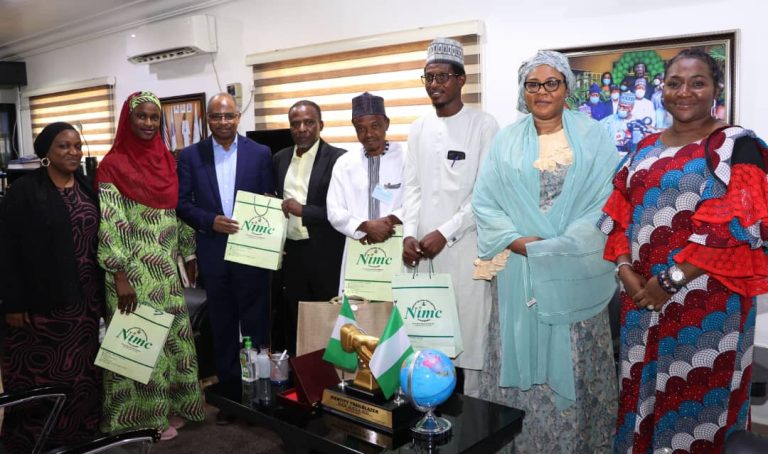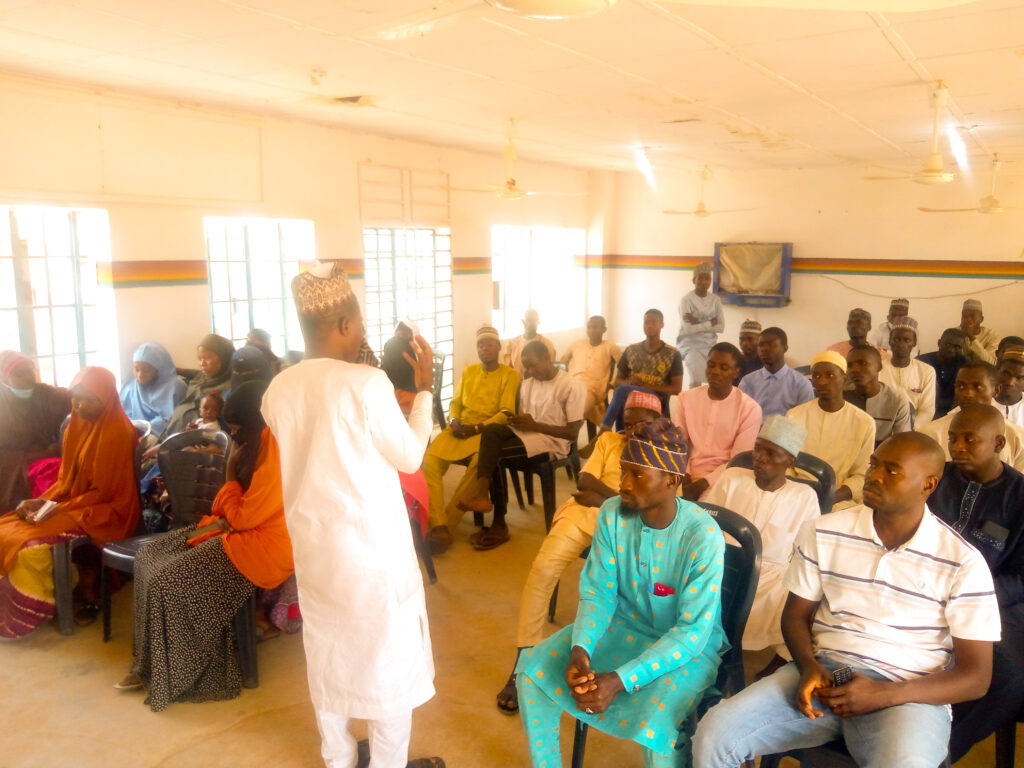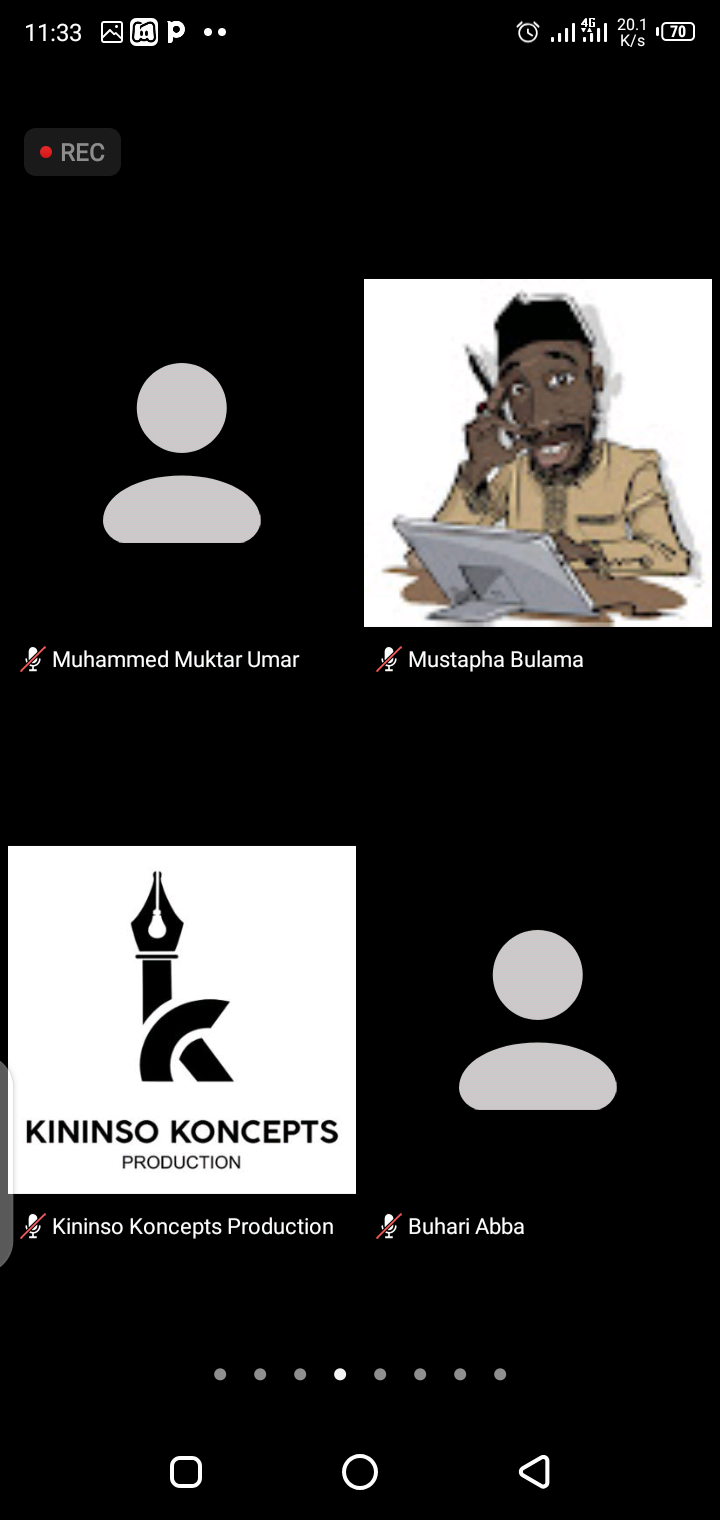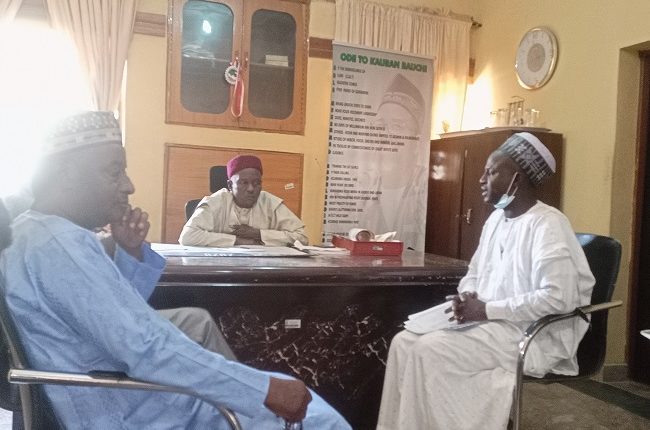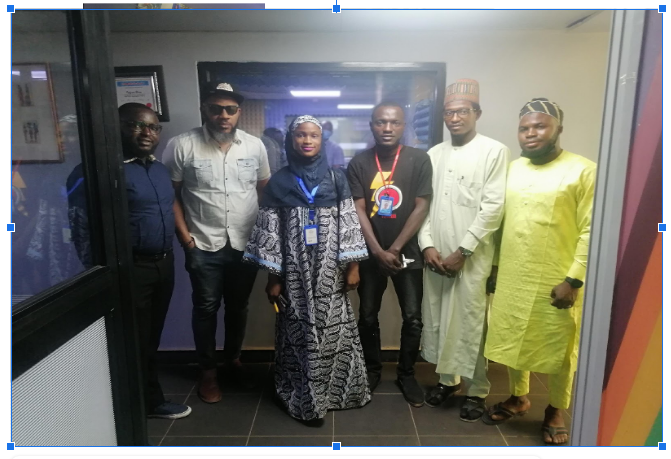INTRODUCTION
On the 14 th of September, 2022 the Centre for Information Technology and Development held
the 4 th Women Internet Governance Forum as part of the 2022 Internet Governance Forum
activities. The event which is being held annually is part of the Nigerian Internet Governance
Forum (NIGF) pre-event activities., This year, the event theme was Making the Internet for
Livelihood, Love and Life: Tackling Gender and Child Abuse Online and was held online with a
limited physical attendance/participation in Kano. The theme was a well thought one, looking
at the global happenings around gender and child abuse online which has become a norm by
the perpetrators. Madam Marry Udoma, Chair West African Internet Governance Forum served
as the chair with Mrs. Ibukun Odusote, Chair, Kalu D Foundation as the Keynote Speaker while
Jan Moolman, Co-Manager: Women’s Rights Programme, Association for Progressive
Communications served as the Guest Speaker.
Also, two technical sessions were held on Gender Violence Online and Child Protection Online.
At the two sessions, distinguished personalities and experts on Gender Based Violence and
Child Protection spoke and shared their experience and knowledge with the participants. The
first session which was titled Dealing with Gender Violence Online was chaired by Professor
Amina Kaidal of the University of Maiduguri while the speakers at this session were Zainab
Aminu, CITAD Technical Officer, Mrs. Martha Alade, Founder, Women in Technology and Msen
Nabo, Digital Media Associate at Connected Development.
The second session which focused on Dealing with Child Protection Online, had Hajiya Suwaiba
Muhammad Dankabo, Programmes Manager at ActionAid International as chair while Aminu
Adamu Naganye of the Star Newspaper, Harira Wakili, a Gender and Human Rights Activist and
Barrister Aisha Mahdi of Green Edge Attorneys served as the speakers.
OPENING SESSION
In his opening remarks, the Executive Director of CITAD, Y.Z Ya’u started by explaining the
purpose of this year’s WIGF during which he stated that, the essence of organizing the forum
was to encourage discussion, especially among women, on internet governance and harvest
strategies for addressing issues that tend to reinforce the marginalization of women in the
digital space. Mr. Ya’u further stated that the WIGF focuses on two specific issues:
2
- Issues of Gender Based Violence: in this regards, Mr. Y.Z said a lot of young women have
suffered and still suffering from different kind of gender violence from people whose aim was
to deter them from using the internet. He also lamented that in some cases these young
women face gender violence by their social media friends. Moreover, the Executive Director
also said many women especially political aspirants are being abused and castigated on social
media based on their gender, which contributes in furthering the political marginalization of
women. - Child Abuse Online: on this, the Executive Director stated that the Federal Government of
Nigeria has set up panel to advise on a policy framework on how to address this issue. Speaking
further on this, Ya’u hoped the forum would give the participants a chance to harvest strategic
ideas that can help in shaping the policy, raise awareness and involve other stakeholders in
trying to sanitize the digital ecosystem so that the women in particular can be able to make
effective use of the internet in the country, have access to educational materials and ability to
use the internet without being harassed or intimidated.
Speaking about the importance of the internet, Mr. Ya’u stated that internet allows individuals
and academics to make research when there is accessible and safe internet. Fearing that some
factors may hinder the proper use of the internet, Ya’u advocated that factors which inhibit
people from using the internet needed to be removed and issue of affordability should also be
addressed. He observed that women find it more difficult to access the internet than men due
to the economic disparity that exists between two.
Moreover, Ya’u said the aims of the forum were to: improve user security competence among
women, ensure women are able to use the internet safely & secure their communications and
that their privacy is well respected. At the end, he emphasized that “we must take internet as a
right for everybody in the country”
Giving her remarks at the Forum, the West African Chair of the Internet Governance Forum,
Mrs. Marry Uduma said in discussing about children and women on the net, we need to first
understand that these category of people are already being marginalized and a huge gap exists
in the society. She also stated that women and children are every day being abused and
violence being meted on them online but little is being done to curtail the situation. Further,
the West African Chair said, these categories needed to be encouraged and supported to use
the internet without being harassed and their rights not being violated in order to benefit from
the ample opportunities the internet presents. At the end she encouraged the participants to
actively participate at the forum.
The Keynote Speaker at the Forum, Mrs. Ibukun Odusote, Chair, Kalu D Foundation mentioned
that in the early days of the internet, it has been a concern to the whole nation. Discussing on
3
the responses to Gender Abuse Online and the multiple questions to address bordering around
gender violence online, the keynote speaker said, there is need to develop campaigns messages
to counter the misusers of the internet and contributed to the current processes of developing
national strategy on child protection online. The speaker also stated that the essence is to find
ways on how to address physical and online abuse, and how to protect vulnerable people from
being harmed on the internet. For this, she said more budget need to be allocated to this area.
Mrs. Ibukun went further to state that under United Nations Charter for Child Protection, every
child is expected to have a fundamental right to education, a right to health and a right to
livelihood, children are supposed to be allowed to speak and to be heard, but a lot of
constraints are preventing them from being able to fully access their fundamental rights
especially in Africa due to the cultural issues. Speaking about the ample advantages of the
Internet, Mrs. Odusate said if there was no internet during the COVID-19 pandemic, many
people could have lost their lives. The internet had also served as school for many children
during the lockdown, however, it also came with many disadvantages where some people used
it to abuse children.
Buttressing child abuse further, the keynote speaker said child and women abuse is a daily
reality in Nigeria; six out of ten children experience one form of abuse or the other, one in four
girls, and ten percent of boys have also been abused according to UNICEF data. She said
Technology when use in the right way has a potential to broaden opportunities and reduce the
level of abuse if there are proper guidance. The keynote speaker also lamented that many
opportunities are still not fully explored, but people tend to use the negative side of the
internet, bullying others and amplifying hate speech on social media platforms.
On the negative consequences of child abuse on education, Mrs. Odusate said report has
shown that one in five children skipped school due to abuse, and of recent, kidnapping of
school children has also brought a lot of problem to children education in the country.
Discussing about the strategies to follow in preventing gender abuse and safety promotion
among children, the speaker said, for that, educational institutions must to be protected as well
as ensuring privacy of children online. For this, government must ensure all the necessary
regulations are in place and civil society organizations need to intensify advocacies to relevant
government agencies on the issues. Also teaching digital literacy and online safety skills will go
a long way in addressing the menace.
Moreover, there was need to articulate and introduce policies on how to prevent the abuses,
promote parental care education, enlightenment on online activities for the children and
women need to be properly educated. There is need for guidelines on installation of
appropriate technology and software to prevent children falling into the traps of their abusers.
4
And creating trauma management techniques and advocacy for protecting young people online
will go a long way in finding the solution to the problem.
In her contribution, the Guest Speaker, Ms. Jan Moolman started her contribution by saying
that the journey for the improvement of women’s rights especially on the internet is a difficult
one, looking at how the internet impact the lives of women from the ICT to digital technology,
from the focus of ICT for D from the 1990s to 2000s and even in the contemporary discussion
regarding privacy, disinformation, misinformation, censorship and hate speech, the role of
women in influencing, shaping and benefiting from digital technology is getting much more
grounded, and this recognition is largely due to the consistent work of organizations and people
in the global south that consistently call for inclusion, diversity and bringing gender approaches
to all the work that concerned human rights, both online and offline. Information around
gender based violence has been at the core of this work and has duly serve in bringing different
actors into the same room to find solution, the speaker added. She went further to say that it
took many years of lobbying and advocacy and work within women movement, including
building knowledge, research, campaigning, sharing experience and finally getting a common
language to get recognition on violation women experience when they are online. And this
work and persistency led to the 2018 adaptation of the UN Human Rights Council first ever UN
resolution on preventing and responding to violence against women and girls in digital context
and other different resolutions including the recent one in Africa has brought more relief to
women and girls in the continent.
Speaking on the issues APC and its partners pay more attention to when it comes to women
rights and digital technology, Ms. Moolman mentioned the followings:
- Joy, hope and Justice: according to the Guest speaker, for people who experienced
violence online, there is hope they can find joy with regards to connection, information,
solidarity, friendship, fun and even in some cases love. And for this, APC and its partners
think it is important to encourage people to continue the work they are doing and to
keep women safe and in a productive way on the digital space. - Access: Even though women face many forms of violence online but there is need to
ensure they have access to online platforms as easily and affordable as possible in order
to carry out their normal activities. Emphasizing on how women are being marginalized
when it comes to accessing the internet, the speaker said, the 2019 ITBU report stated
that globally only 48% of women are online and in the global south this is even lower at
28%. This according her shows that there is wide gap between the connected and
unconnected in the society. And unless we are able to address the issue of accessibility,
many women and marginalized communities will remain in darkness and their voices
silent.
5
- Third is about companies that own social media platforms that are regulating contents
that lacks clarity and consistency and which upon violate the rights of people without
accountability or remedy. These companies are determining online discourses with
focus on profits at the expense of users’ privacy and rights. - The fourth is about how feminists organizing online and offline are expanding and taking
new forms. These groups are upon targeting for gender based violence online and it
sometimes manifest to offline spaces.
FIRST TECHNICAL SESSION: DEALING WITH GENDER VIOLENCE ONLINE
CHAIR: Professor Amina Kaidal
PANELISTS: Martha Alade, Zainab Aminu, Msen Nabo
The first technical session was on Dealing with Gender Violence Online. The session which was
chaired by Professor Amina Kaidal of the University of Maiduguri had Mrs. Martha Alade,
Founder of Women InTechnology, Zainab Aminu, Gender Technical Officer, Centre for
Information Technology and Development and Msen Nabo, Digital Media Associate at
Connected Development.
In her presentation, Zainab Aminu started by defining the Gender-Based violence which
according to her refers to harmful acts directed at an individual based on their gender and
rooted in gender inequality, the abuse of power and harmful norms. Mss. Aminu said Gender-
based violence (GBV) is a serious violation of human rights and a life-threatening health and
protection issue, which is estimated that one in three women experiences sexual or physical
violence in their lifetime.
Zainab further stated that gender violence is not a new phenomenon; it has been existing since
time immemorial which can include sexual, physical, mental and economic harm inflicted in
public or in private and threats of violence, coercion and manipulation. Mss. Aminu also said
gender violence can take many forms such as intimate partner violence, sexual violence, child
marriage, female genital mutilation and so-called ‘honour crimes’ while its consequences are
devastating and can have life-long repercussions for survivors.
Speaking about the impact of cyber violence, the speaker said it differs according to the victim’s
gender. She gave an example with a study conducted by the Pew Research Centre which
revealed that 38% of harassed women found their most recent experience with online
harassment extremely or very upsetting, compared to only 17% of harassed men. The research
further said that compared to male users, who tend to be more concerned about damage to
their reputation, females are more likely to fear physical harm. This corresponds to the nature
of online abuse these groups experience. Where men and boys are more likely to be victims of
defamation and libel, women are more likely to be subjected to derogatory remarks or sexual
6
images and threats, such as non-consensual pornography. She gave another example with
another study which found that female college students (age 18-24) who were victims of offline
stalking were three times more likely to be stalked online than their male counterparts. The
study also found that “while particular variables influence victimization risk among females,
virtually none of the variables in the analyses produced statistically significant relationships
with victimisation among males”.
Moreover, Zainab said key distinction between offline and online gender-based cyber violence
is that it is significantly more difficult “to permanently remove abusive or triggering content
from the Internet, which obliges the survivor to re-experience their victimisation all over again.”
This can exacerbate the psychological impacts of these forms of violence, such as flashbacks of
the incident and/or perpetrator, as well as increase the victim’s isolation period.
Discussing on the long term negative impact of gender violence online, Zainab said the greatest
impact that women experience is self-censorship. Women start censoring themselves online.
And that is what the abusers want. Another impact she said is that online violence attempts to
keep women from major sectors of the public sphere because public only take physical violence
seriously. The third impact is that some women leave the online platform [after being
harassed]. The forth impact which is being associated with online violence is public health issue
and the effects which results in physical, sexual, psychological or economic harm, and erodes
self-esteem.
Offering some solutions on how one can protect selves online, Zainab Aminu mentioned the
followings:
• Creating a strong password
• Having different passwords for different accounts
• Downloading apps from authentication platforms and using two factor verification
• Logging out of accounts when not in use
• Not using public WIFI for sharing sensitive information
At the end the speaker said, to stop gender violence online, there is need for public awareness
in order for people to understand it consequences which in many cases metamorphosed to
offline.
The second speaker, Mrs Martha Alade started by quoting the 1993 UN Declaration on the
Elimination of Violence against Women which defines ‘violence against women’ as an act of
gender-related violence (GBV) that results in, or is likely to result in, physical, sexual,
psychological or economic harm or suffering to women, including threats of such acts, coercion
or arbitrary deprivation of liberty, whether occurring in public or in private life [or online].
7
Discussing on the different types of Gender Violence Online, Mrs Alade said it includes; Doxing
(leaking unauthorized info to public), Sexist abuse, Hate speech, Threat to free expression,
Threat to privacy, Impersonation, Defamation, Gender-based discriminatory memes,
Cyberstalking, Online misogyny etc. On the category of people that experience Gender
Violence, Mrs Martha said women and girls from marginalised communities are the easy
targets and their voices are often unheard. Mrs Alade also said, in most of the times, girls in
local communities are being violated but they are not even aware they are being violated. She
gave a scenario on a case they worked on which happened to a small girl in a community they
are working in and the girl was abused but due to lack of proper awareness about the issue she
was not even aware she was abused until she was examined then it was discovered the girl was
violated.
At the end, the speaker said, to stop gender violence the followings need to be considered
- Education in local languages
- Increase Sensitization/Advocacy – culturally responsive and relevant
- Consent and privacy
- Human Rights Enforcements by Public and Private
- Employ AI for Filtering offensive contents
- Content Enhancement
- Enable more support and help channels for victims
- Drive programs that amplify voices of the marginalized women and girls
- Support NGOs working around the subject
The third at this technical session, Miss Msen Nabo, Digital Media Associate at Connected
Development said appealing to governments to take the issue of GBV more serious is
something its advocates need to take beyond social media and also people’s attitudes need to
be changed. Mss. Nabo also stated that Gender Violence especially online is something that
people come across everyday but most of the times the victims ended up being punished by the
society. The gender activist said when victims of gender violence try to speak out against the
violence mated on them they usually receive silent feedback or they are advised to keep mute
in order to protect their image.
Mss. Msen went further to say that a clear example where government is an accomplice to this
act is the case of Kano State where the State House of Assembly refused to domesticate the
Child Protection Act even though the state is ranked among the states with high rate of gender
8
based violence and child abuse. According her, this need intense advocacies and awareness
creation.
Speaking further on how people violate others on social media platforms, Mss. Nabo stated
that sharing someone’s pictures, address, videos without his/her consent are all forms of
violence online and these types of violence can turn to offline. And for this, she suggested that
advocacies and awareness creation need to be carried out in order to stop it.
SECOND TECHNICAL SESSION: DEALING WITH CHILD ABUSE ONLINE
CHAIR: Hajiya Suwaiba Muhammad Dankabo
PANELISTS: Barrister Aisha Mahdi, Harira Wakili, Aminu Adamu Naganye
The second session was moderated by Hajiya Suwaiba Y. Dankabo of ActionAid Nigeria and the
Three (3) distinguished personalities and experts on Gender Based Violence and Child
Protection spoke and shared their experience and knowledge with the participants.
A Gender and Internet Right Advocate, Harira Abdulrahman Wakili started her presentation
with explaining the ample opportunities internet presents to young generations, Mss. Wakili
said that growing up internet offers limitless opportunities through computers, smartphones,
gaming consoles, and televisions, children learn, imagine and develop their social networks. But
she cautioned that these platforms need to be used in the right way, where she stated that
when these are used in the right way – and accessible to all – the internet has the potential to
broaden horizons and ignite creativity. She also said that with these opportunities come serious
risks. Harira added that cyberbullying and other forms of peer-to-peer violence can affect
young people each time they log on to social media or instant messaging platforms. Speaking
about what children can be exposed to on the net, Miss Wakili mentioned that when browsing
the internet, children may be exposed to hate speech and violent content – including messages
that incite self-harm and even suicide. According to her, what happens online reflects the
realities children face every day – at home, at school and in their wider communities. In
conclusion, Ms. Wakili emphasized that every child must be protected from violence,
exploitation and abuse on the internet.
The Second speaker at this session was Barrister Aisha H. Mahdi of Green Edge Attorneys, who
emphasized that with the widespread use of the Internet, the advancement in technology and
the proliferation of Internet-enabled devices have created borderless and unlimited access to
information. Barr. Aisha said progress brings by the internet has given the bad eggs in the
society the opportunities to exploit, put the children at risk, and make them vulnerable to
abuse. She said that there is an urgent need to balance the immense benefits of technology,
commercial interest and ensuring online safety of children with appropriate safeguards and
strong legal and institutional framework. Speaking on the safety on children online, the speaker
9
said there is a growing concern about the safety and privacy of children online which is amongst
the problems identified by relevant stakeholders in Nigeria.
Discussing about the internet penetration in the country, Barrister Mahdi said as internet
penetration increases, more children are connected to the grid, and this gives the children
better understanding of technology than the average adult. The speaker also mentioned that
new phones, smart toys, computers, and privileges for using a device give birth to new
responsibilities. Speaking about the exposure of the children to social media, Aisha stated that
the increased use of social media and online services allows children to share and consume
tremendous volume of personal information online. And at the same time the children use the
Internet as a means to learn, share and participate in civic life.
The legal practitioner added that in Nigeria, Section 37 of the 1999 Constitution and Section 8
of the Child Rights Act provide for children’s right to privacy. And Section 23 of the Cybercrimes
Act 2015 punishes child pornography. The Cybercrimes (Prohibition and Prevention) Act also
criminalizes cyberbullying and cyber stalking that could affect children. According to her,
though the Act punishes consumption of such contents and provides for other offenses, there is
no other specific legal guidelines or direction to protect the online safety and privacy of the
Nigerian child. Giving recommendations on how to safeguard children online, Barrister Aisha
Mahdi said:
i. Nigeria needs an online privacy protection law for children which will seek to protect
the personal information of children on websites, online services and applications
and it should be binding on online service providers collecting the personal data of
children to ensure consent management.
ii. Service providers should require the consent of the parents or guardians if the data
collection affects a child below the established age.
iii. There is need to digitalize the Nigerian courts and repeal some laws to ensure
efficient and quick judgments related to children abuses
Sharing his experience at the forum, a Kano based journalist, Aminu Adamu Naganye of The
Star Newspaper said Internet Service Providers and Electronic Service Providers need to ensure
their platforms are secure and do not put children at risk. He added that Service providers
should implement privacy and security by design and default. Service Providers have to do
more in creating and ensuring age-appropriate contents by managing content and dealing
effectively with abuse, misuse of their platforms and illegal contact with children.
Aminu Naganye said the legal framework alone cannot guarantee complete protection for the
Nigerian child. Excessive regulation will stifle children’s participation and access to the immense
benefits of the internet. Speaking further, Mr. Naganye said there is need for increased digital
literacy for both children and their parents/guardians. According him, providing this will ensure
children implement best privacy preferences, understand the implication of oversharing, and
have good online behavior. Another recommendations the journalist gave was that
parents/guardians should ensure they always install safety tools on their wards’ devices which
will protects children from inappropriate behavior and laying their hands on inappropriate
10
online contents. It will also prevents disclosure of personal information and assist parents and
guardians manage time spent on the devices.
CLOSING
Following the presentations, participants asked questions and made comments as well offered
specific recommendations that would help in making the internet safer for both women and
children. This segment also allowed the presenters to clarify on some of the issues they raised
and positions advanced as well as father interrogated some of the proposed solutions to the
challenges that women and children face online. Participants agreed that there was need to
carry both the discussion and the proposed solutions offline to reach more people and
especially engage government and other stakeholders to respond to these challenges so that
both women and children would use the internet safely and productive to ensure that it serves
their needs.
The organizers also promised to distill the recommendations and issue a communique as the
outcome of the Forum while exploring all possibilities to continue to engage both the
participants at this Forum as well as other stakeholders to mount a sustained public awareness
on the issues and an advocacy for action to address the problems,
